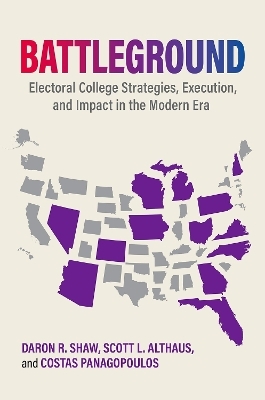
Battleground
Oxford University Press Inc (Verlag)
978-0-19-777437-3 (ISBN)
- Lieferbar (Termin unbekannt)
- Versandkostenfrei innerhalb Deutschlands
- Auch auf Rechnung
- Verfügbarkeit in der Filiale vor Ort prüfen
- Artikel merken
Although US presidential campaigns are among the most closely followed events in the world, academic research tends to conclude that they are much less important for shaping election-day outcomes than broader economic conditions and more gradual socio-political trends. If so, then what campaigners do and say might be entertaining, but should rarely have a decisive influence on who wins the White House. Yet because academic studies typically treat presidential elections as singular events, there is surprisingly little research that considers the strategies that parties pursue in presidential campaigning across multiple election years, how those strategies have evolved over time, or what difference those strategies might make on election day.
Drawing on internal campaign records and novel data sources covering every presidential election from 1952 through 2020, Battleground identifies the Electoral College strategies for every major presidential campaign in the modern era, assesses how well they executed their plans, and illuminates what difference their state-by-state allocation of candidate visits and television spending made on election day. From Eisenhower to Trump, Daron R. Shaw, Scott Althaus, and Costas Panagopoulos show how battleground states have been selected and contested, and why campaign strategies are important for shaping Electoral College outcomes. They find that presidential campaigns in the modern era have been consistently strategic, sophisticated, and effective. As a result, campaign strategies can still be pivotal for shaping Electoral College outcomes, even if their influence looks somewhat different today than in 1952. Battleground provides readers with a sophisticated yet straightforward look at how (and how much) presidential campaigns affect the selection of the most powerful person in the world.
Daron R. Shaw is the Frank C. Erwin, Jr. Chair of State Politics at the University of Texas at Austin. He specializes in Campaigns, Elections, Public Opinion, and Voting, and served as a strategist in the 1992, 2000, and 2004 presidential election campaigns. Shaw is co-director of the Fox News Poll, a member of the Fox News Decision Desk, and associate Principal Investigator for the 2024 American National Election Study. He served as George W. Bush's representative on the National Historical Publications and Records Commission and as an academic director for Barack Obama's Commission for Election Administration. Scott L. Althaus is Merriam Professor of Political Science, Professor of Communication, and Director of the Cline Center for Advanced Social Research at the University of Illinois Urbana-Champaign. His research explores the communication processes that support political accountability and that empower discontent in both democratic and non-democratic societies. His work with the Cline Center includes curating the world's largest registry of coups and attempted coups, authoritatively documenting police uses of lethal force in the United States, and developing new data resources for tracking protests, riots, and acts of political violence around the world. Costas Panagopoulos is Distinguished Professor and Chair in the Department of Political Science at Northeastern University. He specializes in campaigns and elections, voting behavior, and campaign finance and was part of the NBC News Decision Desk between 2006-2020. He has authored, co-authored, or edited 10 books and over 100 scholarly articles, and is the editor of American Politics Research.
Preface
Acknowledgements
Chapter 1: A New Look at Presidential Campaigns in the Modern Era
Chapter 2: Strategy, Time, and Presidential Campaigning
Chapter 3: Wholesale Campaigning (1952-1972)
Chapter 4: Zero-Sum Campaigning (1976-2000)
Chapter 5: Micro-Targeted Campaigning (2004-2020)
Chapter 6: Tracking Electoral College Strategy Over Time
Chapter 7: Tracking the Allocation of Resources Over Time
Chapter 8: Putting it all Together: Resource Allocation and Vote Outcomes
Chapter 9: The Future of Presidential Campaigning (and Beyond!)
Appendix
Notes
References
Index
| Erscheinungsdatum | 04.08.2024 |
|---|---|
| Verlagsort | New York |
| Sprache | englisch |
| Maße | 157 x 236 mm |
| Gewicht | 476 g |
| Themenwelt | Sozialwissenschaften ► Politik / Verwaltung ► Staat / Verwaltung |
| Sozialwissenschaften ► Politik / Verwaltung ► Vergleichende Politikwissenschaften | |
| ISBN-10 | 0-19-777437-7 / 0197774377 |
| ISBN-13 | 978-0-19-777437-3 / 9780197774373 |
| Zustand | Neuware |
| Haben Sie eine Frage zum Produkt? |
aus dem Bereich


